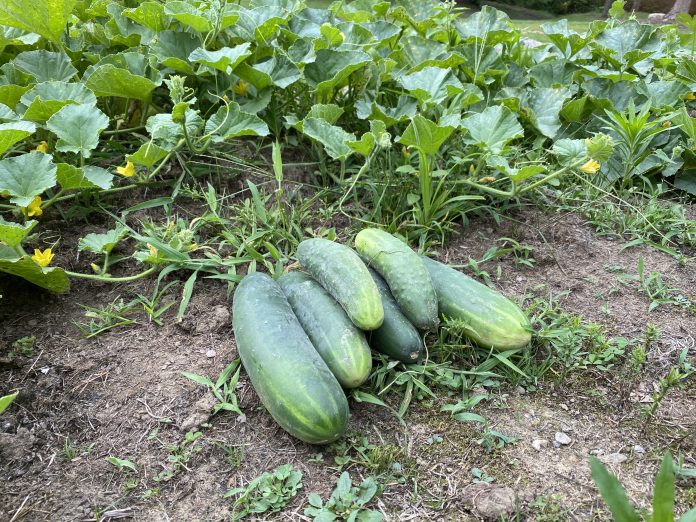I may not be able to grow reasonably-sized tomatoes or peppers, but what I lack in skills growing members of the nightshade family, I make up for in luck growing members of the gourd family, especially cucumbers. At this point, I have a cucumber garden with some other plant varieties sprinkled in. We’re eating cucumber salad every night and still have an oversupply.
Fortunately, an abundance of cucumbers can be safely preserved for long-term storage by making freezer pickles.
Freezer pickles
Many members of the gourd family don’t freeze and thaw well because of their moisture content. As vegetables with high water contents freeze, large ice crystals form and damage cell walls. This creates a mushy mess when these vegetables are thawed and the ice crystals melt.
Cucumbers are 90% percent water and cannot be frozen and preserved plain without becoming mushy. However, they can be prepared and frozen as pickles. During the pickling process, salt draws out some of the water within the cucumbers and the concentrated sugar syrup used to pickle them firms them. Cucumbers should be thinly sliced to maximize surface area and the amount of syrup they can absorb.
Bread and butter pickles are a good option for the freezer pickle technique due to the way cucumbers have to be sliced to optimize the final product. Many canning recipes for bread and butter pickles allow cucumbers to be sliced as thick as ½ inch, but they should be ⅛ to 1/16 inch for freezer pickles.
How to make freezer pickles
Ingredients (makes 4 pints of freezer pickles)
- 8 cups cucumbers
- 2 tablespoons canning or pickling salt
- 2 cups sugar
- 1 cup white or cider vinegar of 5% acidity
Spices of your choice (1 teaspoon celery seed and/or mustard seed works well)
Steps
- Wash cucumbers and remove blemishes. You don’t have to peel the cucumbers. However, commercially waxed cucumbers should be avoided because the coating interferes with the absorption of the brine. And pickling cucumbers are preferred because they have thinner skin.
- Remove the blossom and stem ends and slice cucumbers 1/16-⅛ inch thick.
- Salt slices to draw excess water out of cucumbers. Evenly distribute salt on cucumber slices and any other vegetables you plan to include in the pickling mixture.
- Cover salted cucumbers and allow to stand at least 2 hours. If allowed to stand for longer than 2 hours, place cucumbers in the refrigerator.
- Drain cucumbers and discard liquid. If you want to remove some of the saltiness, you can also rinse the cucumbers.
- Prepare the syrup using 2 cups of sugar, 1 cup of white or cider vinegar of 5% acidity and your spices. Mix these ingredients together, stirring in the sugar until all of the crystals have been dissolved and the syrup is smooth. Cooking the syrup isn’t necessary, but if you use a recipe that requires it, make sure to cool the syrup before pouring it over the drained cucumbers.
- Pour syrup over drained cucumbers in a bowl and refrigerate for 24 hours.
- Place cucumbers and syrup in freezer containers, leaving ½ of headspace in each for the syrup to expand. Seal containers with plastic wrap, pressing the cucumbers under the syrup. Then cover the containers with lids and freeze. Leave space in between containers in the freezer, so they freeze quickly.
- Freezer pickles should be thawed in the refrigerator for use. They need to be used within two weeks and shouldn’t be left out at room temperature for more than 2 hours.













Hello Sara, this freezer method for B&B pickles was just what I was looking for! Question: can I use sugar substitute in this? For example “Truvia” which is mostly Erythritol and a little Stevia. Thanks, Carolynn
Unfortunately, Carolynn, sugar substitutes will not work the same way.